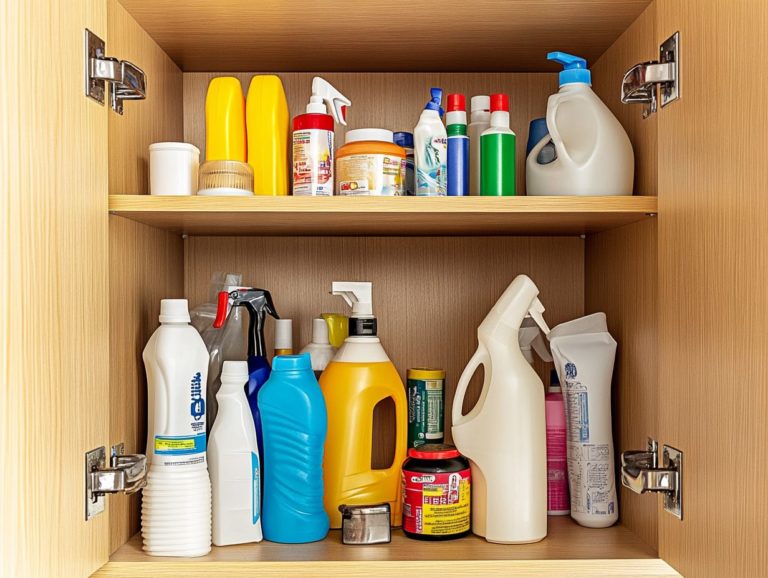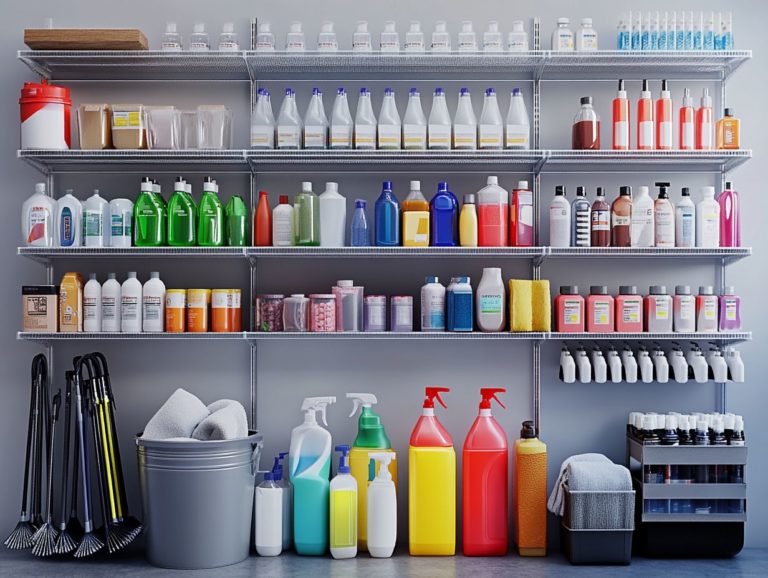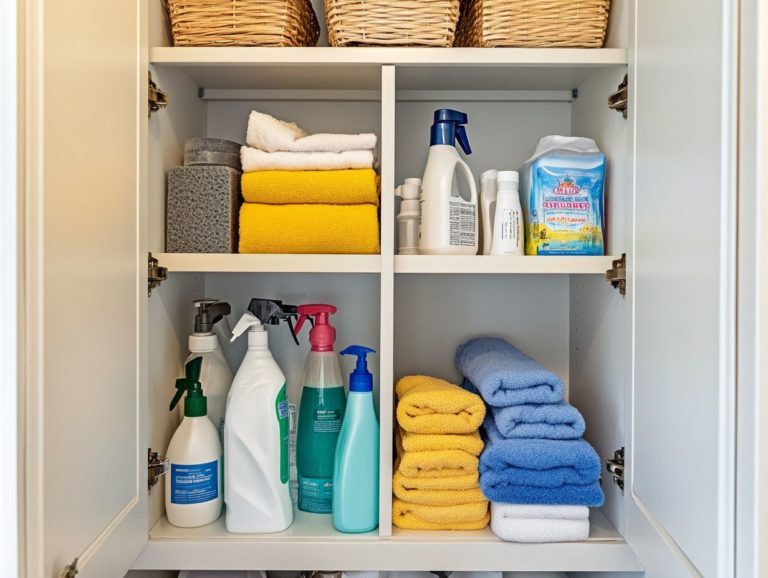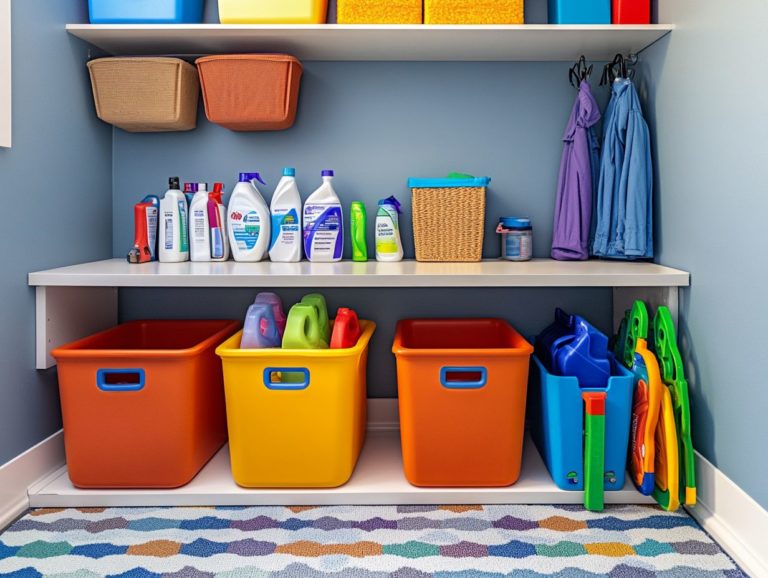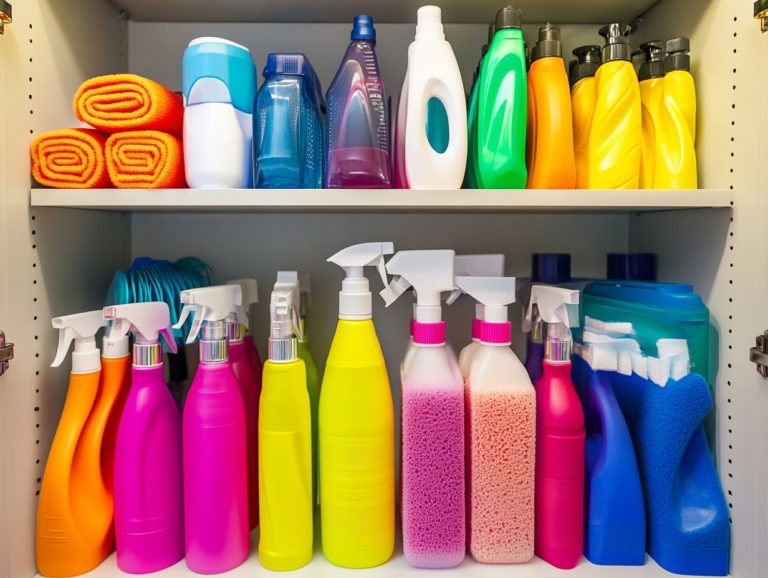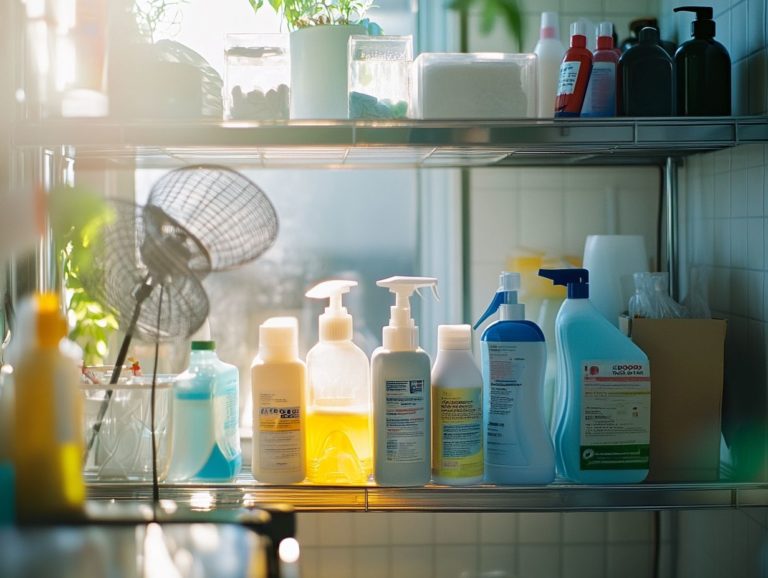Signs Your Cleaning Products Are Expired
Cleaning products are vital for ensuring that your home remains safe and hygienic. However, using expired cleaning products can introduce health risks and diminish their effectiveness.
Recognizing the importance of checking expiration dates is essential for safeguarding both your well-being and your environment. Paying attention to the cleaning product lifespan is one of the key cleaning tips every household should follow.
This article delves into how to identify expired products, the potential hazards of using them, appropriate disposal methods, and strategies for extending their shelf life. You will also learn about safe disposal practices and other helpful cleaning techniques to maintain an effective cleaning process.
Your health and home deserve the best! Keep reading to uncover essential tips for safe and effective cleaning.
Contents
- Key Takeaways:
- Why is it Important to Check Expiration Dates on Cleaning Products?
- What are the Signs that a Cleaning Product has Expired?
- What are the Potential Dangers of Using Expired Cleaning Products?
- How to Properly Dispose of Expired Cleaning Products?
- How to Properly Store Cleaning Products to Extend their Shelf Life?
- Frequently Asked Questions
- What are the signs that my cleaning products are expired?
- Can expired cleaning products still be effective?
- Are expired cleaning products safe to use?
- What should I do with expired cleaning products?
- How can I prevent my cleaning products from expiring?
- Is it okay to mix expired cleaning products with new ones?
Key Takeaways:
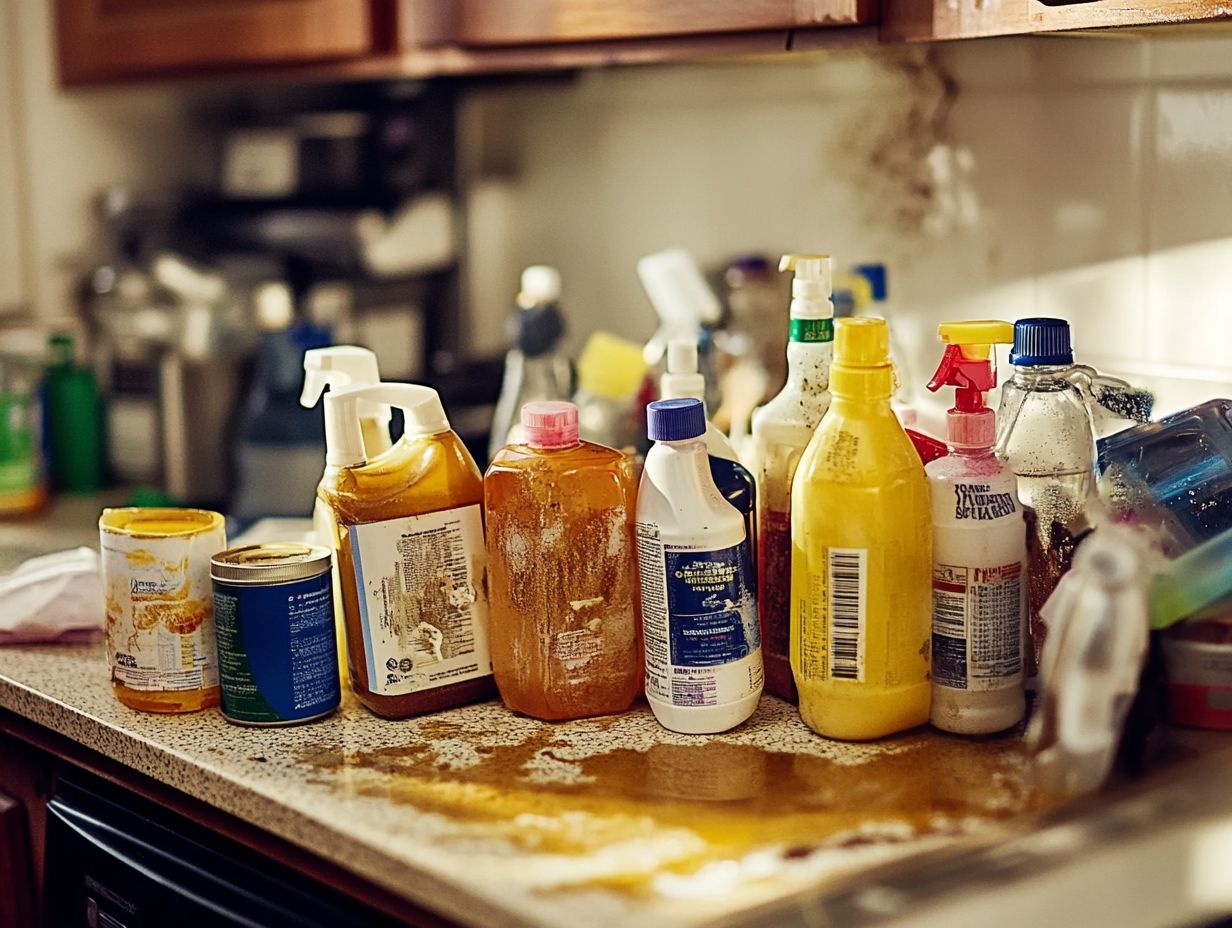
- Always check expiration dates to keep your cleaning safe and effective!
- Signs of expiration include changes in color or texture, strange smells, and ineffectiveness. Look for visual cues in household cleaners and other cleaning agents.
- Expired cleaning products can cause skin irritation, respiratory issues, eye irritation, and chemical burns. Following health guidelines is crucial to avoid these risks.
Why is it Important to Check Expiration Dates on Cleaning Products?
Checking the expiration dates on your cleaning products is essential for ensuring both safety and effectiveness during your cleaning routine. Many cleaning agents, including bleach and disinfectants, come with a specific shelf life that can significantly impact their performance.
Always follow health guidelines to ensure you are using them properly. Using these products beyond their expiration date can not only diminish their cleaning power but also pose health risks.
The American Cleaning Institute underscores the necessity of being mindful of the manufacturer date. Being aware of expiration dates helps you avoid using products that don’t work and could cause skin or breathing problems.
Katie Holdefehr and Isaac Winter from Real Simple also emphasize the importance of using fresh cleaning supplies.
What are the Signs that a Cleaning Product has Expired?
Recognizing the signs that a cleaning product has expired is crucial for maintaining a safe and effective household cleaning routine. You should watch for common indicators, such as noticeable changes in color or texture and unusual odors.
If you see any separation of ingredients, it can make the product less effective at cleaning. Experts like Alex Reed and Jena Touray from Blueland recommend being vigilant about these signs.
Additionally, being aware of these signs will help you ensure that your cleaning routine remains both safe and efficient.
1. Changes in Color or Texture
Changes in the color or texture of your cleaning products can signal that they ve expired and might not work as effectively as intended.
For instance, if your cleaning spray appears cloudy or has thickened, it s a clear indication that its active ingredients the main components that make the product effective have degraded, rendering it far less effective.
When you reach for dish detergent, be on the lookout for any unusual color shifts or an unexpectedly viscous texture; these can suggest degradation and hint that it may not tackle grease as efficiently.
Hydrogen peroxide should ideally stay a clear, colorless liquid; any brown discoloration indicates that it has broken down and is no longer suitable for disinfecting tasks.
It’s essential to check the cap or nozzle for any blockages or buildup, as these could imply contamination or a decline in quality. Regularly inspecting expiration dates and storing these products in cool, dark places will help maintain their efficacy, ensuring that your cleaning routine remains both effective and safe.
Leading brands like Clorox and Seventh Generation provide guidelines for optimal storage conditions.
2. Strange Smells
Strange smells wafting from your cleaning products are often a clear sign that a product has gone bad. For instance, if you notice that a bottle of hand sanitizer is giving off an unusual odor, it likely means that the formulation has deteriorated and is no longer safe to use. Experts from the Environmental Protection Agency recommend avoiding products with such odors.
It s essential for you to remain vigilant when evaluating your cleaning supplies. Some products may even develop a rancid or vinegar-like scent, indicating they’ve surpassed their shelf life. If you notice such odors, check for any visible changes in color or consistency as well.
To ensure a safe cleaning environment, always follow product labels and safety guidelines, especially with expired items that could be ineffective or, worse, potentially harmful.
By implementing regular checks of your cleaning agents, you not only promote a healthier home but also minimize unnecessary exposure to potentially dangerous chemicals.
3. Ineffectiveness
Ineffectiveness in cleaning products is a major indication that they may have expired. If a disinfectant fails to eliminate germs or your laundry detergent no longer tackles stains effectively, it s likely that the active ingredients are no longer effective.
Common items such as all-purpose cleaners, glass cleaners, and even certain types of bleach can lose potency over time, making them less dependable for maintaining a hygienic environment. To assess the performance of these products, you can check the expiration date on the label, look for any changes in texture or scent, or conduct a simple test like applying the cleaner to a small stained area and observing the results.
Using ineffective cleaning products not only results in a less pristine home but can also pose health risks. Harmful microorganisms may persist in inadequately disinfected areas, potentially impacting your overall well-being. Syed Naqvi from Therapy Clean emphasizes the importance of effective cleaning agents in maintaining a hygienic environment.
4. Separation of Ingredients
The separation of ingredients in your cleaning products is a clear indicator that they have expired and should not be used. When you notice that a bottle of bleach or a multi-surface cleaner exhibits you can see the ingredients separating, it signals a breakdown of the formulation, rendering it ineffective for your cleaning tasks.
This separation can result from various factors, such as prolonged exposure to heat or light, which can degrade the active ingredients within the product. As time goes by, the chemical bonds may weaken, leading to a separation that not only undermines cleaning effectiveness but also raises important safety concerns.
When it comes time to dispose of these products, it s essential to follow your local waste guidelines. Generally, it s best to take any unused or expired cleaning supplies to designated hazardous waste facilities, or special places that safely dispose of harmful materials. This responsible disposal approach helps prevent pollution and ensures that potentially harmful chemicals do not seep into the water supply or ecosystem. Guidance from experts at Heartland Alliance and Above and Beyond Family Recovery Center can also be invaluable during this process.
What are the Potential Dangers of Using Expired Cleaning Products?
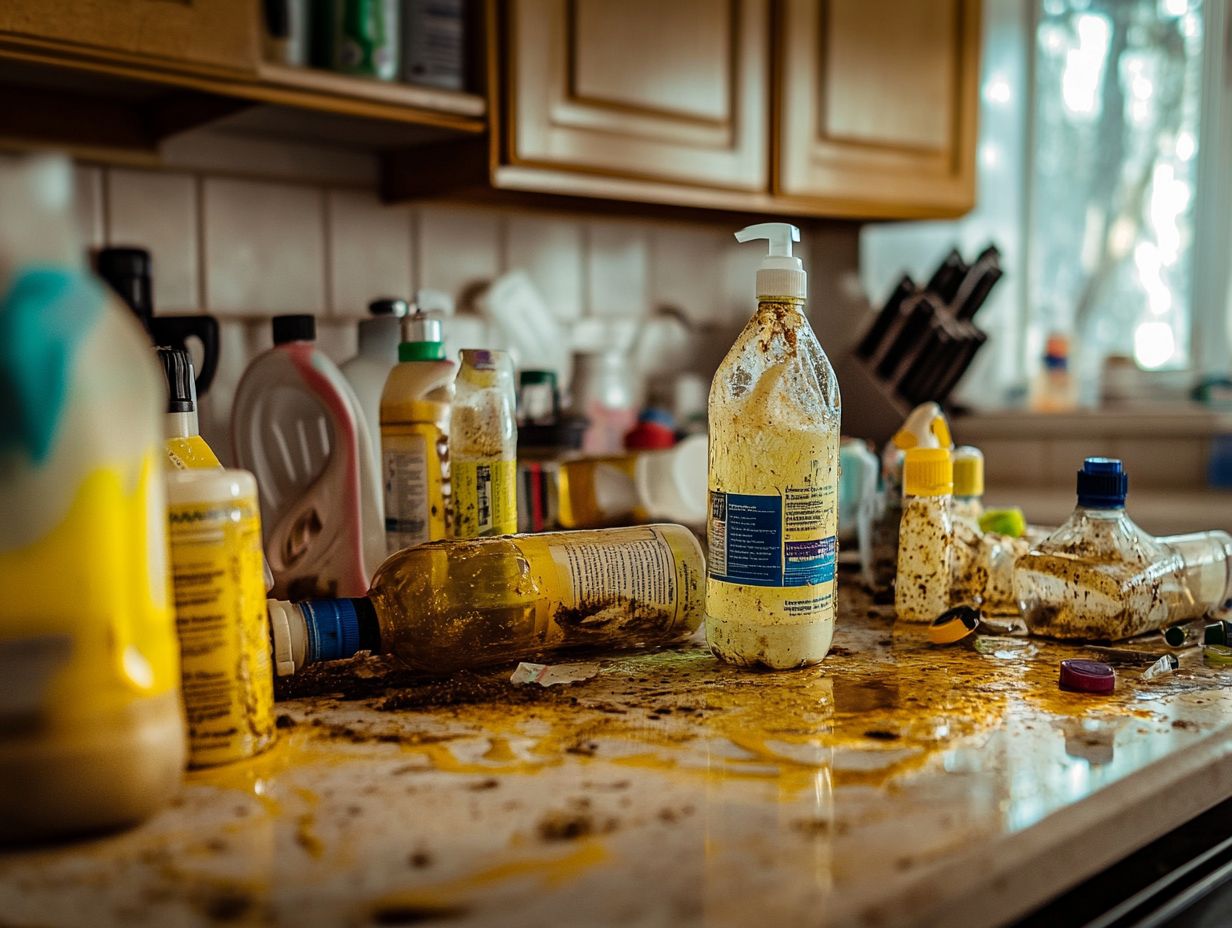
Using expired cleaning products can present serious dangers to your health and safety at home. The risks are quite concerning: you might experience skin irritation, respiratory issues from inhaling degraded chemical compounds, or eye irritation from accidental splashes.
In more severe cases, there s even a risk of chemical burns, particularly with potent substances like bleach and strong disinfectants. Don’t wait check your cleaning supplies today to keep your home safe! It’s essential to be mindful of these potential hazards and ensure that your cleaning supplies are safe and effective.
Understanding the dangers of expired cleaning products is crucial for a safe home.
1. Skin Irritation
Skin irritation is a common concern when using expired cleaning products. Over time, the ingredients in these cleaning agents can become harsh, leading to rashes or allergic reactions upon contact with your skin.
Certain chemicals, such as bleach, ammonia, and various surfactants (which help break down dirt and grease), are particularly notorious for triggering skin sensitivity, especially in individuals with existing conditions. To minimize the risk of irritation, always check the expiration dates and avoid any products that show changes in color or consistency.
When handling these cleaners, always don protective gear, like gloves and masks if necessary, to shield yourself from harmful fumes. Proper disposal methods are crucial; they not only reduce environmental harm but also ensure you re not exposing yourself or others to expired or unwanted chemicals.
Store all your cleaning supplies in a cool, dry place, away from direct sunlight, to maintain their stability and effectiveness.
2. Respiratory Issues
Expired cleaning products can pose serious respiratory risks, particularly when their effectiveness wanes, resulting in harmful fumes or inadequate sanitization. Inhaling these degraded chemicals can worsen conditions like asthma or allergies.
When using these products in enclosed spaces, the concentration of fumes can rise dramatically, increasing the likelihood of health issues for you and anyone nearby. It s crucial to be aware of the hidden dangers that can arise from poorly stored or expired cleaning supplies.
To protect yourself from these risks, consider opting for eco-friendly cleaning alternatives. They clean effectively and are gentler on your health.
Ensure proper ventilation open windows or utilize exhaust fans during your cleaning sessions to disperse any lingering harmful particles, creating a safer environment for everyone involved.
3. Eye Irritation
Eye irritation is a serious concern when using expired cleaning products, as their changing chemical composition can lead to harmful reactions upon contact. If a product splashes into your eyes, you could experience redness, discomfort, and even permanent damage in severe cases. Always consult health guidelines from institutions like Lake Forest College and use eco-friendly alternatives like products from Tusitala to minimize risks.
This underscores the critical importance of wearing eye protection when cleaning, especially with potentially hazardous substances. Protect your eyes always wear goggles!
If contact occurs, immediate first aid is essential. Gently rinse your eyes with clean water for at least 15 minutes to alleviate irritation and minimize damage. It s also wise to seek medical attention promptly if symptoms persist or worsen, ensuring you receive the appropriate care.
4. Chemical Burns
Chemical burns can occur if you use expired cleaning products, especially those with potent ingredients like bleach and strong acid-based cleaners that can behave unpredictably over time.
These burns can range from mild irritation to serious tissue damage, highlighting the need for caution when handling such substances. If you or someone else comes into contact with these hazardous materials, rinse the affected area thoroughly with lukewarm water for at least 15 minutes and seek medical attention if needed.
To minimize risks, always store cleaning agents securely, ideally in their original containers, to prevent accidental exposure. Be sure to dispose of any outdated or unused products responsibly, protecting both your health and the environment.
How to Properly Dispose of Expired Cleaning Products?
Properly disposing of expired cleaning products is crucial for preventing environmental contamination and safeguarding your well-being. Following local disposal guidelines is paramount, as many cleaning agents and chemicals have specific regulations that must be adhered to for safe disposal.
By taking these steps, you not only protect the environment but also contribute to a healthier living space. Follow local disposal guidelines today to keep your home and environment safe!
1. Check Local Guidelines
Checking local guidelines is your first step toward the responsible disposal of expired cleaning products. Different municipalities often have specific regulations concerning waste that can be harmful to people or the environment and chemical disposal that you need to be aware of.
To pinpoint these essential regulations, visit your local government s website, usually found under the waste management or environmental services sections. The Environmental Protection Agency (EPA) website offers a wealth of information on household hazardous waste and includes a directory of state-specific resources.
If your online research yields limited results, reach out directly to your local sanitation department for expert guidance. Adhering to these guidelines not only protects your personal health but also plays a vital role in safeguarding the environment. Improper disposal can seriously harm our soil and water let’s protect our planet together!
By taking these proactive steps, you ensure both safety and compliance an investment in a cleaner, healthier community.
2. Do Not Pour Down the Sink or Toilet
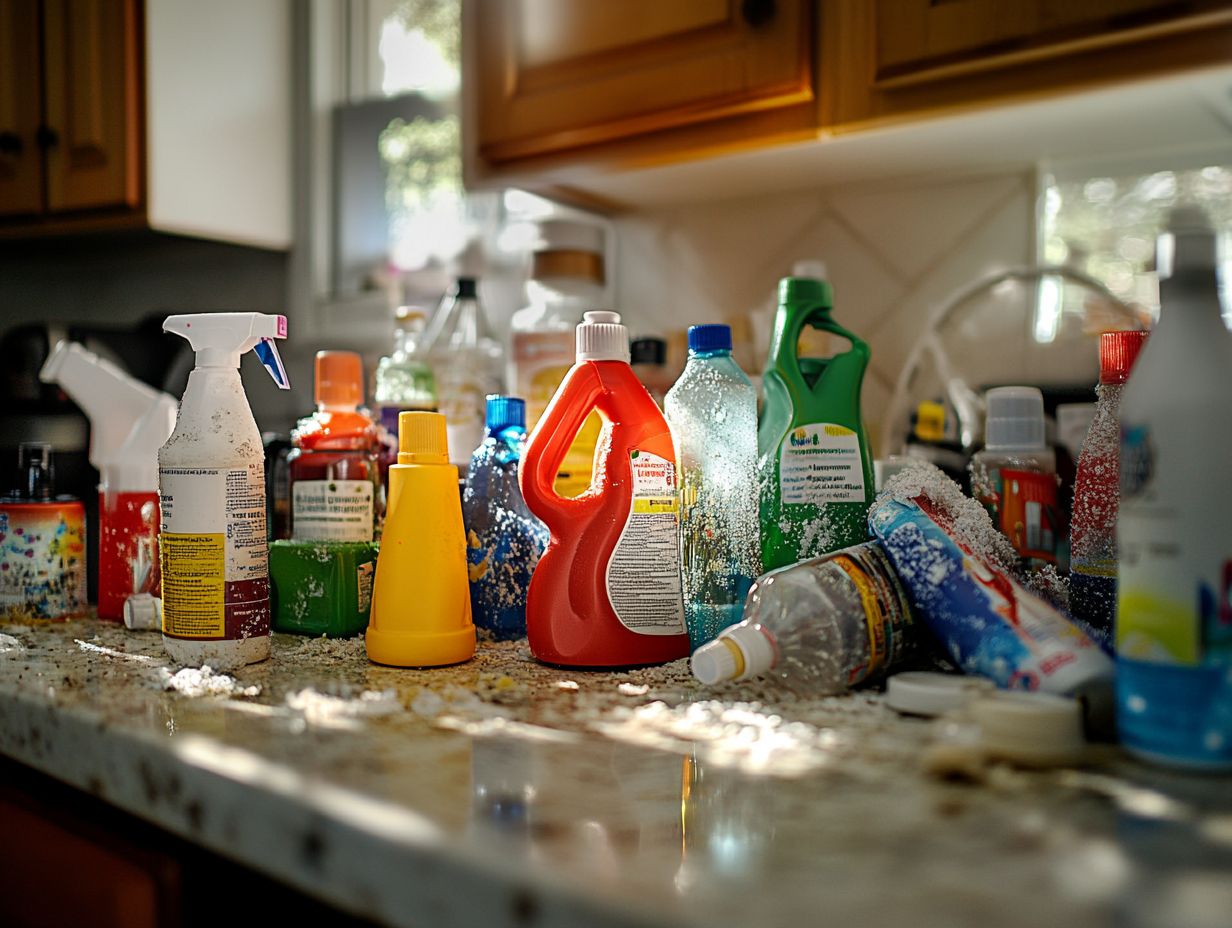
Never pour expired cleaning products down the sink or toilet; doing so can lead to environmental contamination and disrupt plumbing systems. Many household cleaners contain harmful chemicals that may wreak havoc on ecosystems if they make their way into waterways.
Consider alternatives that protect the environment and enhance safety in your home. A smart approach is to take these products to designated hazardous waste collection sites, where trained professionals can ensure their proper disposal. Many communities host periodic events or maintain facilities specifically for this purpose, making it easier for you to handle potentially dangerous substances with the care they require.
You can typically check with local waste management services for guidelines on how to manage such items responsibly. This helps you prevent accidental spills or harmful reactions in your domestic waste systems.
3. Contact the Manufacturer
Don’t hesitate to reach out to the manufacturer of your expired cleaning products. They can provide crucial information on how to dispose of them safely. Companies such as Clorox and Seventh Generation often provide guidelines to help you dispose of their products responsibly.
In an era where environmental concerns dominate corporate responsibility, these manufacturers are increasingly prioritizing sustainable practices that effectively minimize harm to our ecosystems. By reaching out to them, you can gain valuable insights into eco-friendly disposal options, as many companies are now dedicated to reducing their environmental footprint.
It’s becoming standard practice for brands to offer resources that guide you in proper disposal and encourage recycling initiatives and alternatives. Engaging directly with these manufacturers can significantly enhance your efforts, ensuring that cleaning product disposal aligns with the growing trend toward sustainability and environmental consciousness.
How to Properly Store Cleaning Products to Extend their Shelf Life?
Properly storing your cleaning products can greatly enhance their shelf life and preserve their effectiveness over time. Keep your cleaning products in their original containers to maintain their effectiveness, away from heat sources, and in a cool, dry place.
Steering clear of direct sunlight is also crucial, as it can degrade their ingredients and compromise their performance. By taking these simple steps, you ensure that your cleaning supplies remain as potent as the day you bought them.
Start making a difference today by properly disposing of your expired cleaning products!
1. Keep in a Cool, Dry Place
Storing your cleaning products in a cool, dry place is crucial for extending their shelf life and maintaining their cleaning effectiveness. High temperatures and humidity can accelerate the breakdown of active ingredients, leading to a decline in performance.
To create optimal conditions, take a moment to evaluate your storage area. Pay attention to factors such as temperature fluctuations, exposure to sunlight, and possible water leaks. The ideal space should be well-ventilated and shielded from direct sunlight to prevent the degradation of chemical components.
It’s also wise to keep your cleaning supplies out of reach of children and pets for added safety. Make it a habit to regularly check expiration dates on products and organize items by type and how frequently you use them. This approach not only enhances safety but also ensures that your cleaning supplies stay potent and ready for action whenever you need them.
2. Keep Away from Direct Sunlight
Avoiding direct sunlight when storing your cleaning products is essential, as UV rays can alter their chemical composition and reduce their effectiveness over time. Items like laundry detergent and hydrogen peroxide are particularly susceptible to light exposure.
To maintain the integrity of these vital supplies, investing in opaque storage containers is crucial. These containers effectively block harmful light, allowing you to keep your cleaning products potent and ready for action.
Organizing your products in a dark cabinet or closet enhances their protection from sunlight. If you prefer open storage, think about using pull-down shades or curtains to shield your shelves when they re not in use.
It s a straightforward yet impactful strategy to ensure your valuable cleaning solutions stay as powerful and effective as intended, helping you uphold cleanliness and hygiene in your home.
3. Keep Out of Reach of Children and Pets
Keeping cleaning products out of reach of children and pets is essential for safety, as many household cleaners contain toxic ingredients. By storing these items away from areas accessible to little ones or animals, you can effectively prevent accidental ingestion or exposure.
To ensure your cleaning supplies remain secure, consider placing them in high cabinets fitted with childproof locks or latches. Additionally, using bins with can further discourage curious hands from accessing potentially harmful substances.
Maximizing space with under-sink organizers is another smart strategy to keep hazardous materials out of sight. Regularly reviewing and rearranging your storage areas can enhance safety, ensuring that any new products introduced into your home are stored securely, far from the reach of inquisitive explorers.
4. Do Not Mix Different Products
Avoiding the mixing of different cleaning products is crucial for your safety, as combining certain agents can lead to hazardous reactions, including toxic fumes or even explosions. For example, mixing bleach with ammonia produces dangerous chloramine gases that you definitely want to steer clear of.
It’s essential for you to understand the specific ingredients in each cleaning product to prevent potentially life-threatening situations. Your household likely contains a variety of cleaners, and without the right knowledge, even your best cleaning intentions can have harmful consequences.
To ensure your safety, always read labels carefully to identify which products are compatible and store them in designated areas to prevent accidental mixing. It’s wise to use gloves, ventilate spaces while cleaning, and consider non-toxic alternatives whenever possible. Additionally, always follow health guidelines when handling chemical cleaning agents such as bleach and disinfectants.
By prioritizing safety and employing responsible practices, you can maintain a cleaner environment without putting your health at risk. Consider using multi-surface cleaners and eco-friendly products from Blueland or Seventh Generation.
Frequently Asked Questions
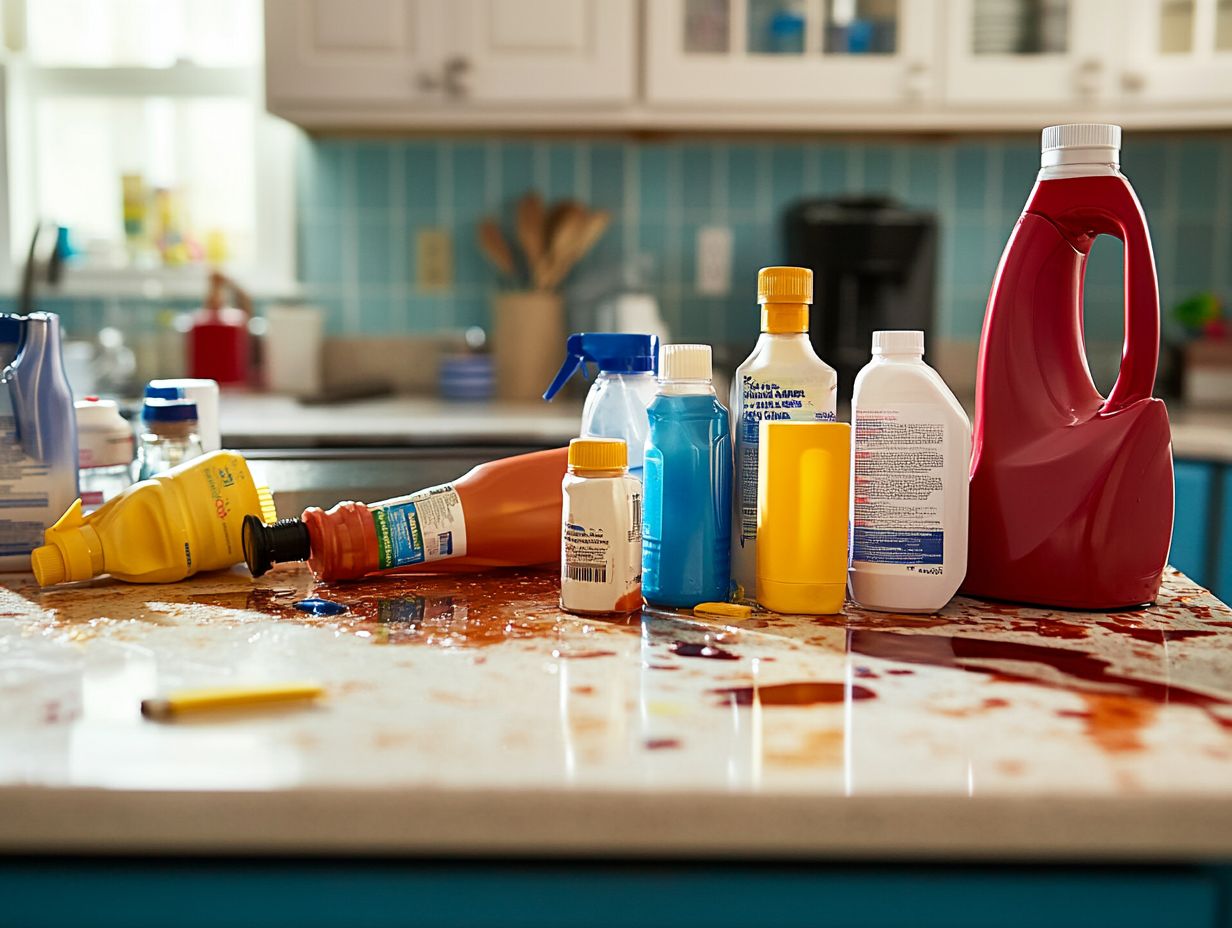
Authored by Katie Holdefehr and Isaac Winter from Real Simple, with inputs from experts such as Syed Naqvi from the American Cleaning Institute and Jena Touray from Tusitala.
What are the signs that my cleaning products are expired?
Some common signs that your cleaning supplies are expired include changes in color, consistency, or scent. You should also check for any mold or bacteria growth.
Always check the expiration date and manufacturer date to ensure the cleaning effectiveness of your products.
Can expired cleaning products still be effective?
No, expired cleaning products may not work as well as they used to. The main components that do the cleaning, such as those found in laundry detergent or cleaning spray, may have lost their potency.
Are expired cleaning products safe to use?
Insights from Jena Touray and experts at the American Cleaning Institute indicate caution.
Do not use expired cleaning products, as they may have become contaminated with harmful bacteria or other microorganisms. Using them may put your family’s health at risk, so play it safe!
What should I do with expired cleaning products?
Expert advice from Alex Reed of Therapy Clean and Clorox recommends safe ways to throw them away.
Make sure to dispose of expired cleaning products safely by following the instructions on the label or contacting your local waste management department. Do not pour them down the drain or throw them in the trash. Consider safe disposal recommendations from organizations like the Environmental Protection Agency.
How can I prevent my cleaning products from expiring?
Tips from Lake Forest College on proper storage techniques can help.
To prevent your cleaning products from expiring, store them in a cool, dry place away from direct sunlight. Avoid buying in bulk and only purchase what you need for immediate use. This will help extend the cleaning product lifespan and ensure their shelf life.
Is it okay to mix expired cleaning products with new ones?
Organizations like Heartland Alliance and Above and Beyond Family Recovery Center advise against mixing to avoid risks.
No, do not mix expired cleaning products with new ones. This can lead to a chemical reaction and potentially release harmful fumes, especially with products like hydrogen peroxide or hand sanitizer. Always dispose of expired products properly.

